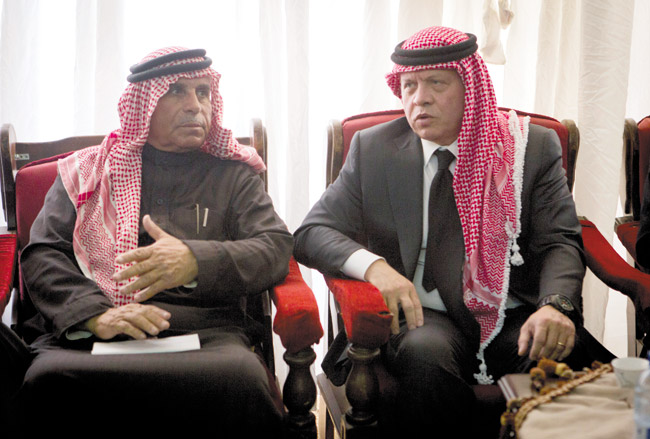New Hope For Moderate Muslims

Jordanian King Abdullah II (right) talks with Safi al-Kaseasbeh, father of slain Jordanian pilot Lt. Muath al-Kaseasbeh, after his arrival to offer his condolences at the memorial tent set up for the slain pilot at their home village of Ai near Karak, Jordan, Feb. 5 NASSER NASSER / AP PHOTO
According to an AP report out of Cairo, Egypt’s new president, Abdel Fattah el-Sissi, opened the new year with a dramatic call for a “revolution” in Islam: to reform current interpretations of the faith entrenched for hundreds of years, which he says has made the Muslim world “a source of destruction, and pitted it against the rest of the world.”
El-Sissi was speaking to the clerics and mullahs of Al-Azhar, the thousand-year-old government/religious institution, possibly the most eminent center of Sunni Muslim thought. It’s an institution traditionally more conservative and known for change only in piecemeal terms.
The speech was his boldest effort yet to position himself as a “modernizer of Islam.” His self-espoused goal is to purge the religion of extremist ideas of intolerance and violence that fuel groups like al-Qaida and ISIS, which appear to have motivated the attack on the headquarters of the satirical Paris newspaper Charlie Hebdo, killing 12 people in the name of Allah.
Even though el-Sissi’s crusade is likely to meet significant resistance in the broader Muslim community, it comes as a surprising breath of fresh air.
His words are what the non-Muslim world has been waiting to hear from a bona fide Muslim leader. The events of the past few days, including the barbaric execution by fire of the young Jordanian pilot-POW captured and held by ISIS, has been the source of world revulsion, Muslim and non-Muslim alike. There couldn’t have been a better example of the fanatical extremism that el-Sissi is targeting.
Jordan’s King Abdullah II was livid after ISIS made public the gruesome video of the Jordanian pilot’s execution.
He has doubled down on his commitment to fight ISIS on all fronts. He consulted with key Congressional leaders during his recent trip to the U.S. and expressed his gratitude for American military aid, but also his frustration with delayed delivery of aircraft parts and other critical material.
Fortunately, Abdullah is a warrior king and seems to have a true affinity for the fight. He himself is qualified as a Cobra fighter/attack helicopter provided by U.S. military assistance. In his meetings with Obama this past week, there seemed to be no hint of “brothers in arms,” or “united in mission” on the part of our president or his people.
His reaction to el-Sissi’s historic speech calling for Islamic reform? Not a word.
Wouldn’t you think an enthusiastic, appreciative or encouraging “How can I help?” phone call would be in order? Nothing of the kind reported. This is the kind of internal self-reform that we should be vociferously acknowledging and encouraging.
A few weeks ago, I resolved to stop criticizing Barack Hussein Obama, but he continues to make that a difficult resolution to keep. ISIS routinely has flaunted its evil nature with televised beheadings, mass assassinations of captives and hostages, and rape of Christian and Muslim women.
But this video of burning the captive Jordanian pilot alive in a cage is unprecedented in its depiction of raw evil, and has caused a rare, nearly universal negative reaction in the Arab world.
ISIS has inadvertently caused even Muslim revulsion toward its tactics, creating what might be a rare opportunity to unite more and more Muslims in the rejection of the evil for which it stands.
This, combined with King Abdullah II’s enthusiasm to take the battle to ISIS, may possibly, by example, convince other Arab countries — the Saudis, the United Arab Emirates, Qatar — that we are looking at possibly a one-time opportunity to unite around a rare common cause.
The U.S. should take this opportunity to show some leadership and initiative while Arab minds are open to possibilities other than more of the same dogma.
Ironically and sadly, past experience tells us that isn’t likely to happen.
coffee1776@gmail.com





